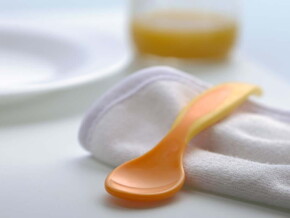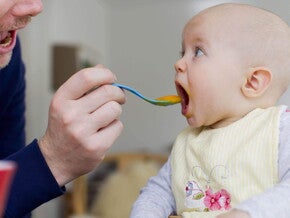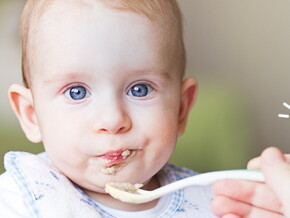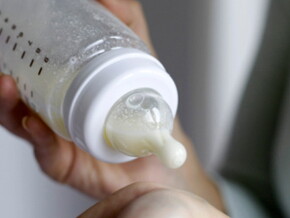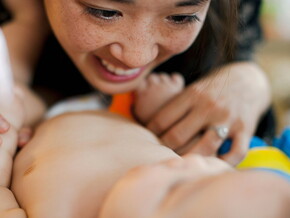
When you were a baby, chances are that your parents were advised not to give you certain foods until you were older. Typically, these would have included peanuts, eggs, shellfish, and wheat.
Recently, that advice has been revised. Rather than delaying giving your baby foods that may trigger an allergic reaction, it’s important that you give them early in the complementary feeding process.
Q&A
Q: I’m breastfeeding and worry that my seven-month-old son might become allergic to some of the foods I’m eating. Should I cut anything out of my diet?
A: No, there’s no need for you to stop eating any foods while you’re breastfeeding to decrease the risk of food allergy for your child. Your diet is important because it can influence the quality of your breast milk, and you don’t need to restrict anything unless advised by your healthcare provider. Make sure you’re eating a healthy, balanced diet that’s rich in nutrients. Have a look at What to eat when you’re breastfeeding as a guide.
Q: I’m allergic to eggs so does that mean my baby is too? Should I avoid giving them eggs completely?
A: Although having a family history may increase your child’s risk of developing allergies , it isn’t always the case. Many children with food allergies are not from high-risk families. Check with your healthcare provider about your child’s specific situation.
The Canadian Paediatric Society recommends that for infants of parents with allergies (high-risk infants) and depending on their readiness for solid foods, to consider introducing common allergenic solids at around 6 months of age, but not before 4 months of age. Consider offering your baby a small amount of cooked eggs mixed with breast milk and/or another previously tolerated food to begin with. Watch carefully for any reactions. Don’t give them other foods that potentially cause allergic reactions at the same time because if you do notice a reaction, it will be difficult to know which food may have caused it.
Q: Should I stick to a few ‘safe’ favourite foods while my baby is young—such as those I have already tried that know he’s not allergic to?
A: Although it’s tempting to offer your healthy baby only foods you know they aren’t allergic to, current recommendations are to include foods they may not yet have tried, such as eggs, fish, and foods containing gluten (such as wheat products), and peanuts (ground). It’s important that you offer them a wide variety of complementary foods, including potential allergy-triggering foods. In fact, research has shown that early food exposure may reduce the risk of an allergic reaction. Early and continued small tastes of foods known to cause allergies may help your baby develop immunologic tolerance, and therefore decrease the chances of allergy. Scientific studies have shown that increasing the diversity of foods in a baby’s first year may decrease their chances of developing asthma and food allergies up to their sixth birthday.
Latest news on peanuts and gluten
Two particular ingredients are getting a lot of attention, both in the scientific community and in the worldwide media:
Peanuts
Due to the fear of a life-threatening reaction, peanut allergy is one food allergy that parents may worry about. Recent research in high-risk young children suggests that peanut allergy may be decreased by introducing foods containing peanuts (ground) early in the complementary feeding process. The latest advice, for healthy babies not previously diagnosed with allergies, is to give your baby foods containing peanuts from around six months of age, in age-appropriate textures. You might offer tiny amounts of peanut powder mixed with breast milk, or watered-down peanut butter. Remember that any nuts should be crushed, ground, or in a format that won’t put your baby at risk of choking. If your baby has eczema or another food allergy, the introduction of peanuts into their diet should be supervised by a healthcare professional.
Gluten
Gluten is a protein found in grains such as wheat, barley, and rye, and people can be allergic to the proteins found in these foods. Celiac disease, on the other hand, is an autoimmune condition where the body’s immune system reacts to gluten and causes damage to the lining of the intestine. Babies with family members who have celiac disease may be at greater risk of developing the condition. Current guidelines suggest that foods containing gluten (such as many breads, pasta, and cereals) be introduced when starting complementary foods for all healthy babies. Start with small amounts, and offer these first tastes at home, rather than at a restaurant or daycare centre, in case of any reaction.
How to spot an allergic reaction
The body reacts to different food allergies in different ways. Some allergic reactions tend to happen immediately, or within one to two hours after the food is eaten.
If your baby is allergic to a certain food, they might show some of these signs:
- diarrhea, vomiting, abdominal pain
- runny nose, coughing, sneezing, wheezing, or breathing problems
- itchy skin or mouth/lips, hives
If you think your child is having an allergic reaction to a food, seek immediate medical attention.
Sources
Abrams EM, Hildebrand K, Blair B, et al. Canadian Paediatric Society Practice Point. Timing of introduction of allergenic solids for infants at high risk. Paediatr Child Health. 2019;24(1):56-57.
Du Toit G, Sayre PH, Roberts G et al. Effect of avoidance on peanut allergy after early peanut consumption. N Engl J Med 2016; 374(15):1435-43.
Du Toit G, Roberts G, Sayre PH et al. Randomized trial of peanut consumption in infants at risk for peanut allergy. N Engl J Med 2015; 372(9):803-13.
Fewtrell M, Bronsky J, Campoy C et al. Complementary feeding: A position paper by the European society for paediatric gastroenterology, hepatology and nutrition (ESPGHAN) committee on nutrition. J Pediatr Gastroenterol Nutr 2017; 64(1):119-32.
Greer FR, Sicherer SH, Burks AW et al. Effects of early nutritional interventions on the development of atopic disease in infants and children: the role of maternal dietary restriction, breastfeeding, timing of introduction of complementary foods, and hydrolyzed formulas. Pediatrics 2008; 121(1):183-91.
Roduit C, Frei R, Depner M, et al. Increased food diversity in the first year of life is inversely associated with allergic diseases. J Allergy Clin Immunol 2014; 133(4):1056-64.
Togias A, Cooper SF, Acebal ML et al. Addendum guidelines for the prevention of peanut allergy in the United States: Report of the national institute of allergy and infectious diseases-sponsored expert panel. J Allergy Clin Immunol 2017; 139(1):29-44.
https://celiac.org/celiac-disease/understanding-celiac-disease-2/what-i… (Accessed December 18, 2017)
Last revised: December, 2017



